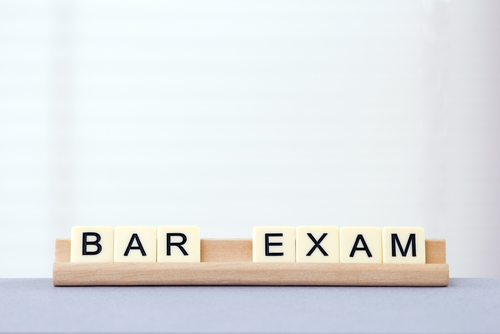California Committee of Bar Examiners recommends keeping bar exam cut score the same

Shutterstock.com
Updated: On Thursday, the State Bar of California’s Committee of Bar Examiners voted 13-1 to recommend leaving California’s bar cut score at 1440, Courthouse News Service reports. Some studies are still ongoing, according to the article, including a content validity study expected to be completed in October.
“I have yet to hear any data that suggests that we should change this cut score not only permanently but definitely not interim,” said committee member Lee Wallach. “Once you go there, you’re not going to go back. So let’s get it right the first time. There really seems to be no rush.”
And on Wednesday, the bar’s Law School Council endorsed lowering the cut score to something between 1350 and 1390, the Recorder reports.
The bar’s Board of Trustees are scheduled to meet Sept. 6 and Sept. 7, and it will make its recommendation to the California Supreme Court after considering both proposals.
Nearly 80 percent of attorneys—but only about 2 percent of those who took this year’s test—believe that California’s bar cut score should remain at 1440, according to the findings of a survey given by the State Bar of California and released in a report (PDF) on Thursday.
Traditionally, the cut score is set by the state’s bar exam committee, but in July the California Supreme Court amended the rule, asserting its own authority to determine the score. At the court’s direction, the state bar commissioned a standards setting study earlier this year, which offered two suggestions at the time: Set a new interim bar exam cut score at 1414 or maintain the current score of 1440.
However, a review of comments from public hearings has resulted in an interim cut score of 1390 to also be considered. According to the report, that score falls within the confidence interval from the study and would have a positive impact on diversity.
Of 34,295 attorneys who responded to an online survey regarding the cut score, 79.8 percent indicated it should not be lowered while 11.6 percent thought it should be 1414 and 4.2 percent thought the score should be reduced further. Among 4,188 test-takers who sat for the California bar in July, only 2.3 percent thought the score should be unchanged while 36.4 percent believed it should be cut to 1414 and 56.7 responded that score should be even lower.
Protecting the public from potentially unqualified attorneys and maintaining the integrity of the profession were the top reasons why attorneys surveyed felt the cut score should remain where it is. For state bar applicants, student loan debt, access to legal services for underserved populations and the recent decline in state bar passage rates were given as the most important reasons to lower the score.
The total pass rate for the 2016 California bar exam was 43.3 percent. If a cut score of 1414 had been in effect, the pass rate would have been 46.8 percent. With a 1390 score, the pass rate would have been 52.1 percent.
The report also details by gender and race how bar passage rates would have spiked if the cut score was lowered.
With a 1414 score, the 2016 bar passage rate for women would increase from 42.5 percent to 46.1 percent. With a 1390 score, the percentage rises to 51.2 percent. For men, the pass rate would rise from 44 percent to 47.4 percent with a 1414 score and 53.1 percent with a 1390 score.
By race, a 1414 cut score would have raised the passage rate by 7.2 percent for whites, 8.7 percent for Asians, 10.6 percent for Latinos and 12.5 percent for African-Americans. With a 1390 cut score, the passage rate increases would have been 17.3 percent for whites, 23.5 for Asians, 26.1 for Latinos and 40.4 percent for African-Americans.
Updated on Sept. 1 to note recommendations from the bar’s committee of bar examiners and the Law School Council.



